Birthdays are more than just personal milestones in Chinese culture—they are celebrations of family, prosperity, and longevity. Whether you're attending a Chinese birthday party, greeting a friend, or simply curious about cultural traditions, knowing how to say "Happy Birthday" in Chinese can deepen your connections and show respect for this rich heritage.
Why should I Say Happy Birthday in Chinese?
While not every birthday receives equal attention in Chinese culture, certain milestones hold special significance. Key celebrations include a child's first month ("满月" full moon ceremony), the 18th birthday marking adulthood, 30 years old reflecting the concept of "三十而立" (establishing oneself), and 60 years old celebrating the transition to elderhood with particular joy and reverence.

Therefore, learning how to give birthday wishes is also a window into understanding Chinese culture.
How to Say Happy Birthday in Chinese: Mandarin and Cantonese
When learning how to say "Happy Birthday" in Chinese, it's important to know that Chinese culture values sincerity and good wishes. There are two main dialects to consider: Mandarin and Cantonese, each with their own unique expressions.
Mandarin Chinese: The most common phrase is "生日快乐" (shēngrì kuàilè), which directly means "birthday happiness." Here's how to pronounce it:
- Shēngrì kuàilè – Pronounced "shung-ree kwhy-luh" (with a light, quick tone)
This phrase is the standard way to wish someone a happy birthday in Mandarin, used in both casual and formal settings.
Cantonese Chinese: When learning how to say "Happy Birthday" in Cantonese—a vibrant, melodic Chinese dialect—the most common and heartfelt phrase is:
- "生日快樂!" (sāang yaht faai lohk) (Literally: "Birthday happiness!")
- Pronunciation Guide:
- "Sāang yaht" (生日) → "sahng yaht" (rhymes with "song" + "yacht")
- "Faai lohk" (快樂) → "fai lock" (like "fly" + "lock" but with a rising tone)
This phrase is universally used in Hong Kong, Guangdong, and Cantonese-speaking communities worldwide.
Both variations (Mandarin & Cantonese) carry rich cultural expressions of joy and goodwill, with additional phrases available that add deeper layers of warmth or blessing depending on the occasion.
Other Ways to Say Happy Birthday in Chinese
Once you've mastered the basic "Happy Birthday," you might want to learn some other birthday wishes that feel more personal and appropriate for different situations.

Mandarin Birthday Greetings
| Chinese Phrase | Pinyin | English Pronunciation | Age Group | English Meaning |
|---|---|---|---|---|
| 生日快乐! | Shēngrì kuàilè | Sheng-ree kwhy-luh | All ages | Happy Birthday! |
| 小宝贝生日快乐! | Xiǎo bǎobèi shēngrì kuàilè | Shyow bow-bay sheng-ree kwhy-luh | 0-6 yrs | Happy birthday, little darling! |
| 学业进步! | Xuéyè jìnbù | Shweh-yeh jeen-boo | 7-22 yrs | Academic success! |
| 事业有成! | Shìyè yǒuchéng | Shir-yeh yo-chung | 23-50 yrs | Career achievements! |
| 福如东海,寿比南山! | Fú rú dōnghǎi, shòu bǐ nánshān | Foo roo dong-high, show bee nahn-shahn | 50+ yrs | Boundless fortune and longevity! |
Cantonese Birthday Greetings
| Chinese Phrase | Jyutping | English Pronunciation | Age Group | English Meaning |
|---|---|---|---|---|
| 生日快樂! | Sāang yaht faai lohk | Sahng yaht fai lock | All ages | Happy Birthday! |
| BB仔生日快樂! | BB jái sāang yaht faai lohk | BB jy saang yaht fai lock | 0-6 yrs | Happy birthday, baby! |
| 學業進步! | Hohk yihp jeun bou | Hawk yip joon boh | 7-22 yrs | Academic improvement! |
| 恭喜發財! | Gūng héi faat chòih | Gong hey faat choy | 23-50 yrs | Wishing prosperity! |
| 長命百歲! | Chèuhng mihng baak seui | Cheung ming bahk soy | 50+ yrs | Live 100 years! |
Each expression offers a special way to wish someone well on their birthday and shows your thoughtfulness. Give these a try when you're at a Chinese birthday celebration and want to make a meaningful connection!
How to Sing Happy Birthday in Chinese
Now that you've learned how to say "生日快乐" (shēngrì kuàilè) in Mandarin, why not take it a step further and sing the Chinese birthday song? Music adds extra joy to celebrations, and singing in Chinese is a fun way to make the occasion even more special!
The Classic Chinese Birthday Song
The most popular version follows the same melody as the English “Happy Birthday” but with Mandarin lyrics:
🎵 Mandarin Version: “祝你生日快乐, 祝你生日快乐, 祝你生日快乐, 祝你生日快乐!”
Pronunciation: “Zhù nǐ shēngrì kuàilè” (Joo nee sheng-ree kwhy-luh) Translation: “Wish you a happy birthday!” Repeat 4 times, just like the English version
🎵 Cantonese Version: “祝你生日快樂, 祝你生日快樂, 祝你生日快樂, 祝你生日快樂!”
Pronunciation: “Jūk néih sāang yaht faai lohk” (Jook nay sahng yaht fai lock) Translation: “Wish you a happy birthday!” Repeat 4 times

Popular Chinese Birthday Song: "Say Bye-Bye to All Worries"
This cheerful song is often sung at Chinese birthday celebrations, especially for children, as a fun way to wish away worries and welcome happiness. It’s simple, catchy, and full of positive energy!
🎶 Lyrics & Pronunciation:
Verse: “对所有的烦恼说 bye-bye” Duì suǒyǒu de fánnǎo shuō bye-bye (Dway swo-yo duh fann-now shway bye-bye) → “Say bye-bye to all your worries!”
Chorus: “跟所有的快乐说 hi-hi” Gēn suǒyǒu de kuàilè shuō hi-hi (Gen swo-yo duh kwhy-luh shway hi-hi) → “Say hi-hi to all the happiness!”
Ending: “亲爱的亲爱的生日快乐” Qīn’ài de qīn’ài de shēngrì kuàilè (Cheen-eye duh cheen-eye duh sheng-ree kwhy-luh) → “Dear, dear, happy birthday to you!”
These songs will definitely bring smiles and create memorable moments at any Chinese birthday celebration!
Chinese Birthday Gifts for Different Age Groups
In Chinese culture, birthdays symbolize prosperity, longevity, and good fortune. Each gift is carefully chosen to match the recipient's age and convey meaningful blessings.
This guide offers thoughtful gift ideas for every life stage, from celebrating children's milestones to honoring elders' wisdom.
Small Kids (婴儿/幼儿) - Babies and Toddlers
When celebrating the birthdays of young children, Chinese families prioritize gifts that symbolize protection, prosperity, and good fortune for the child's future.
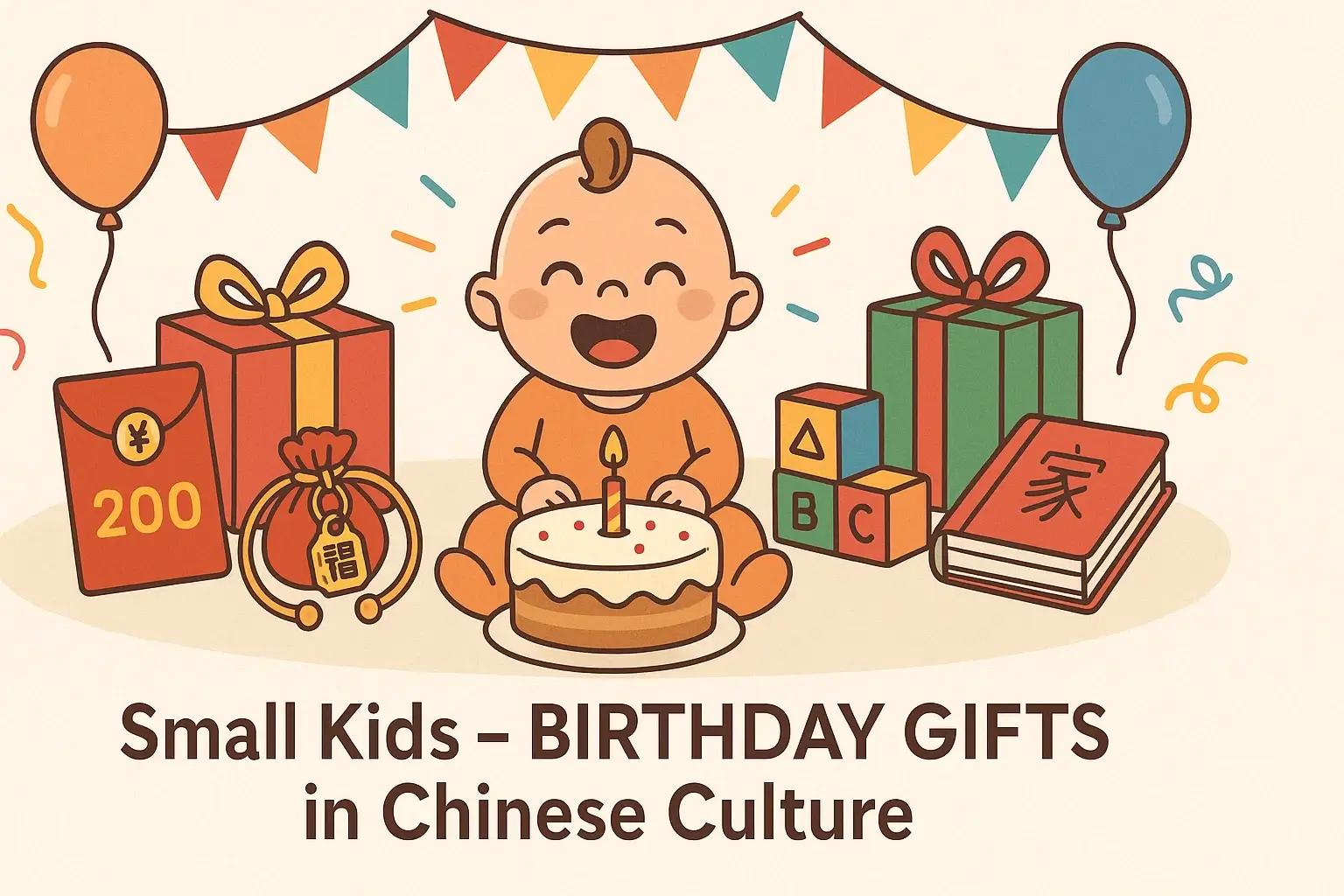
Recommended Gifts:
- Red envelopes (红包, hóngbāo) remain the most traditional and welcome gift, typically containing even amounts like 200元 to ensure good luck
- Gold or silver jewelry such as bracelets adorned with longevity locks (长寿锁) serve as protective talismans while marking the milestone
- Educational toys including wooden puzzles and books featuring Chinese characters help nurture learning while maintaining cultural connection
Items to Avoid: Sharp objects pose safety concerns and are considered inauspicious, while black or white items carry associations with mourning that make them inappropriate for joyful occasions.
Students (学生) - School-Age Children and Teens
Student birthdays focus on encouraging academic success and personal growth, with gifts that support their educational journey.
Recommended Gifts:
- Quality stationery such as engraved pens or beautiful notebooks symbolizes the importance of learning and academic achievement
- Books especially those with motivational themes or cultural significance can inspire and educate
- Small tech gadgets like e-readers or headphones support modern learning while remaining practical
Items to Avoid: Clocks should never be given as gifts, as the phrase "送钟" (sòng zhōng, giving a clock) sounds identical to "送终" (sòng zhōng, attending a funeral), creating an extremely unlucky association.
Young Adults (年轻人) - College Age and Early Career
Young adult celebrations often emphasize style, experiences, and items that support their emerging independence.
Recommended Gifts:
- Fashion accessories such as silk scarves or red bracelets combine style with traditional luck symbols
- Gourmet treats including premium tea or artisanal chocolates offer sophistication and indulgence
- Experience gifts like concert tickets or spa vouchers create memorable moments rather than material accumulation
Items to Avoid: Shoes should be avoided as gifts because "送鞋" (sòng xié, giving shoes) implies "sending someone away," suggesting the relationship will end.
Adults (中年人) - Middle-Aged Recipients
Adult birthday gifts often focus on quality, health, and items that demonstrate respect for their maturity and achievements.
Recommended Gifts:
- Premium alcohol such as high-quality baijiu or fine red wine shows respect, though it's essential to confirm the recipient drinks alcohol
- Tea sets represent harmony, respect, and the importance of taking time for reflection and social connection
- Health-related items including ginseng or goji berries acknowledge the growing importance of wellness and longevity
Items to Avoid: Umbrellas should not be given as gifts because the word "伞" (sǎn, umbrella) sounds similar to "散" (sàn, meaning separation or breaking apart).
Elderly (老年人) - Senior Citizens
Gifts for elderly recipients emphasize longevity, comfort, and respect for their wisdom and experience.

Recommended Gifts:
- Longevity-themed items such as peach-shaped decorations or calligraphy featuring the character "寿" (shòu, longevity) directly celebrate their long life
- Comfortable clothing including silk pajamas or warm shawls prioritize their comfort and well-being
- Red envelopes even with modest amounts like 88元 maintain tradition while the number 8 ensures double luck
Items to Avoid: White or black gifts carry strong associations with funerals and mourning, making them deeply inappropriate for birthday celebrations.
Chinese Birthday Gifts: Dos and Don'ts
Understanding cultural taboos is equally important—certain gifts like clocks, white flowers, or sharp objects should be avoided as they carry negative associations.
Essential Dos ✅
Understanding proper gift etiquette ensures your gestures are received with appreciation and respect.
Red envelopes represent the gold standard of Chinese birthday gifts, with amounts featuring lucky numbers like 6, 8, and 9 carrying special significance. The number 6 represents smooth sailing, 8 symbolizes prosperity, and 9 suggests longevity.
Presentation matters significantly in Chinese culture. Always use both hands when presenting or receiving gifts, as this demonstrates respect and proper etiquette. The physical act of giving becomes as important as the gift itself.
Color choices should emphasize red or gold wrapping, as these colors symbolize luck, prosperity, and joy. The visual impact of your gift communicates your good intentions before it's even opened.
Practical or symbolic items such as tea or fruit baskets combine usefulness with cultural meaning, ensuring your gift serves both immediate needs and deeper cultural values.
Critical Don'ts ❌
Certain gifts carry such negative connotations that they can seriously damage relationships or cause deep offense.

Never gift clocks under any circumstances. The phrase "送钟" (sòng zhōng) creates an unavoidable connection to funeral attendance, making this taboo absolute and non-negotiable.
Avoid shoes, umbrellas, and sharp objects as each carries linguistic associations with separation, breaking apart, or harm that contradict the celebratory nature of birthdays.
White or black gifts should be completely avoided, as these colors are reserved for mourning and funerals in Chinese culture.
Odd amounts of money in red envelopes are traditionally associated with funerals, so always ensure monetary gifts use even numbers.
How Chinese Celebrate Birthdays
Chinese birthday celebrations blend modern Western elements like cakes and candles with traditional customs, especially for milestone birthdays that emphasize family and longevity.
Modern Celebrations
Contemporary Chinese birthday celebrations often incorporate Western elements while maintaining cultural distinctiveness.
-
Birthday cakes have become standard, though Chinese preferences often favor lighter flavors such as fresh fruit or matcha rather than heavily sweet American-style cakes. These cakes serve as centerpieces for the celebration while accommodating local tastes.
-
Singing "生日快乐歌" uses the familiar Western melody while replacing English lyrics with Chinese words: "祝你生日快乐" repeated four times. This blend of familiar and local creates comfort for participants of all backgrounds.
-
Candle-blowing and wish-making follows the Western tradition, but the wishes often focus on family harmony, health, and prosperity rather than individual desires.
Traditional Celebrations
Traditional elements remain important, especially for milestone birthdays and family-centered celebrations.
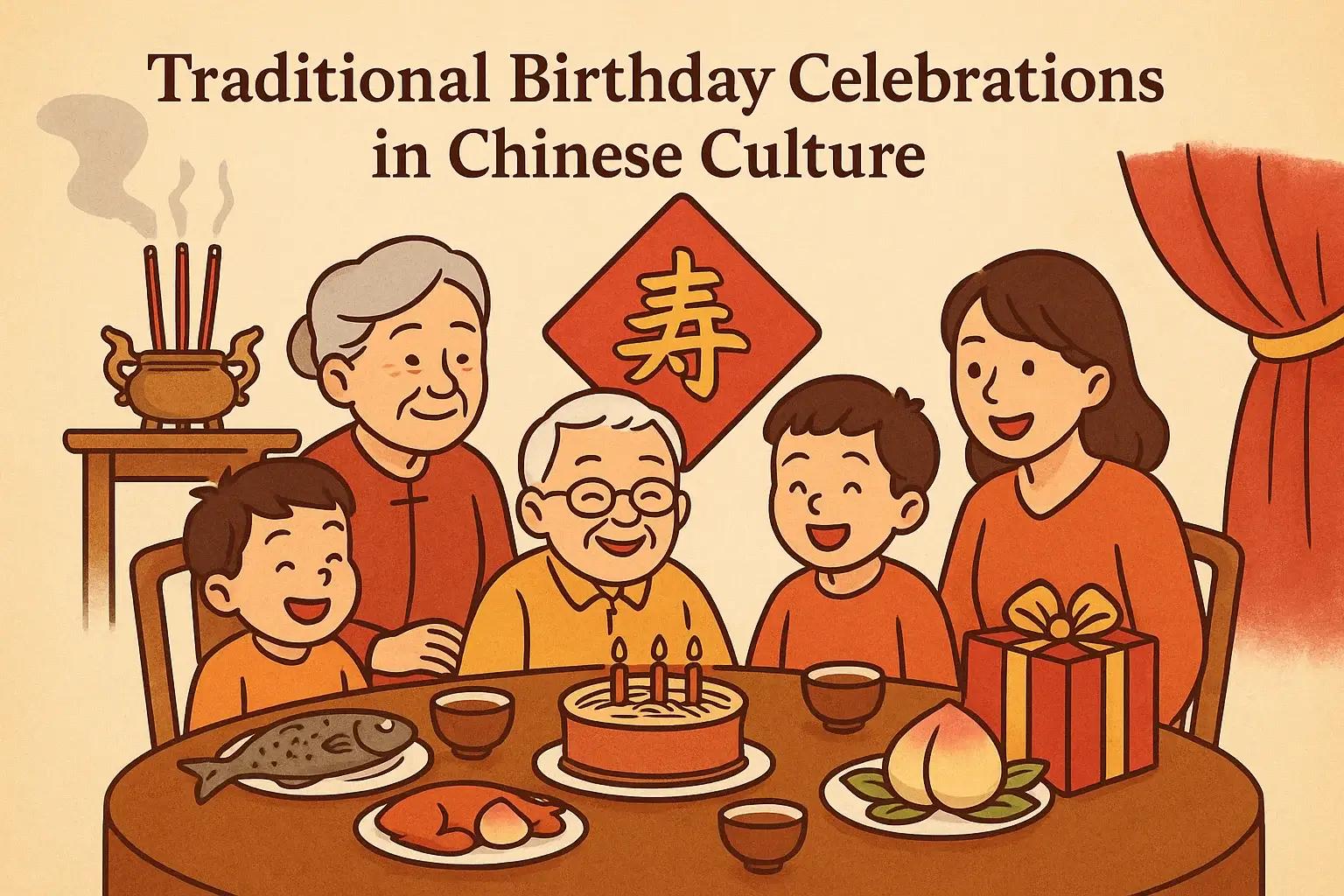
-
Family banquets take precedence over parties, particularly for elders' significant birthdays. These gatherings emphasize respect, gratitude, and family unity rather than entertainment or excitement.
-
Ancestor veneration may include lighting incense or making offerings, connecting the birthday celebration to family history and seeking blessings from deceased relatives.
-
Respectful atmospheres are especially important for elderly celebrants, where loud parties are avoided in favor of quiet joy and meaningful conversation.
Milestone Birthdays
Certain ages carry special significance that demands enhanced celebration and attention.
-
First birthdays (周岁, zhōusuì) feature the traditional "zhuazhou" ceremony, where babies are presented with various objects to grab. Their choice supposedly predicts their future career or personality traits, creating excitement and family bonding.
-
Sixtieth birthdays mark the completion of a full zodiac cycle and deserve particularly grand celebrations. This milestone represents wisdom, experience, and the transition into honored elder status.
-
Eightieth and ninetieth birthdays are called "长寿宴" (longevity banquets) and celebrate the remarkable achievement of long life in Chinese culture, where longevity is deeply valued and respected.
Traditional Chinese Birthday Foods
Must-Have Dishes
Traditional birthday foods carry symbolic meanings that enhance the celebratory atmosphere while invoking blessings for the recipient.
Longevity Noodles (寿面, shòumiàn) represent the most essential birthday food. These extra-long, uncut noodles symbolize long life, and tradition requires eating them without biting through to maintain the luck. The length and continuity of the noodles directly correspond to hopes for the recipient's lifespan.
Red Eggs (红鸡蛋, hóng jīdàn) appear as hard-boiled eggs dyed bright red to symbolize joy and new beginnings. These are particularly common at babies' first birthdays, where the red color drives away evil spirits while celebrating new life.
Peach Buns (寿桃包, shòutáo bāo) are steamed buns shaped like peaches, which represent immortality in Chinese mythology. The peach shape connects the celebration to ancient stories of gods and immortals, invoking wishes for eternal life.
Glutinous Rice Cake (年糕, niángāo) symbolizes "rising" prosperity each year. The sticky texture and upward cooking process represent hopes that the recipient's fortunes will continue climbing higher.
Whole Fish (鱼, yú) must be served with head and tail intact to symbolize "a good start and end" to the new year of life. The completeness of the fish represents wholeness and abundance in the year ahead.
Modern Additions
Contemporary Chinese birthday celebrations often blend traditional foods with modern preferences.
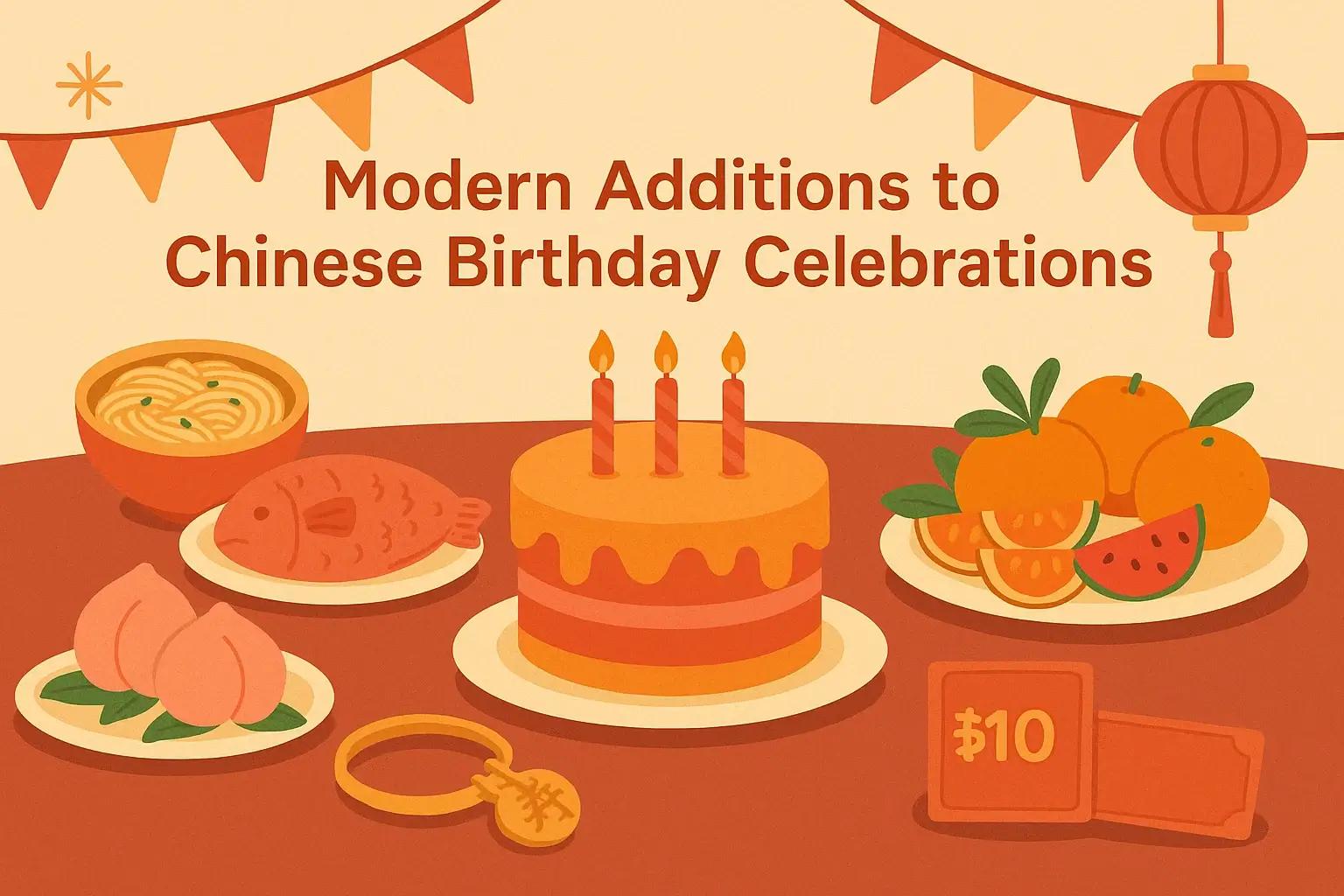
Western-style birthday cakes have gained popularity but are typically less sweet than American versions, accommodating Chinese taste preferences while maintaining the visual centerpiece role.
Fruit platters especially featuring oranges create additional luck symbols while providing fresh, healthy options that complement heavier traditional dishes.
These birthday traditions demonstrate how Chinese culture values family connections, respect for elders, and hopes for prosperity and longevity. Whether participating in or hosting a Chinese birthday celebration, understanding these customs helps create meaningful experiences that honor both the individual and the cultural heritage they represent.
Fun Games at a Modern Chinese Birthday Party
Celebrating birthdays in modern Chinese culture has evolved to blend traditional elements with contemporary fun. These party games combine time-honored symbols of luck and prosperity with exciting activities that guests of all ages can enjoy.
1. Pictionary/Charades 你画我猜 (Nǐ Huà Wǒ Cāi)
This classic guessing game takes on a distinctly Chinese flavor when you incorporate culturally relevant themes. Players split into teams, with one person either drawing pictures or acting out clues while their teammates frantically guess the answer.
How to Play: Divide guests into teams of 4-6 people. Prepare cards with birthday and Chinese culture-themed words written in both Chinese characters and pinyin. One team member draws or acts out the word while others guess within a time limit of two minutes. Teams earn points for correct guesses, and the team with the most points wins.
2. Lucky Draw幸运抽奖 (Xìngyùn Chōujiǎng)
The element of surprise and fortune plays a central role in Chinese celebrations, making lucky draws a perfect party activity. This game transforms the traditional concept of receiving red envelopes into an interactive experience.
How to Play: Prepare numerous red envelopes containing small prizes such as mini toys, candy, discount coupons, or small amounts of money. Display them in a decorative box or hang them on a "money tree." Each guest gets to pick one or more envelopes throughout the party, creating excitement and anticipation.
Upgrade: Add humorous "punishment" cards mixed in with the prizes. These might include singing "Happy Birthday" in a funny voice, doing a silly dance, or telling a joke. This creates laughter and breaks the ice among guests who might not know each other well.
3. Balloon Dance-Off 气球舞蹈 (Qìqiú Wǔdǎo)
This high-energy game combines dancing with friendly competition, creating an atmosphere of joy and movement that's perfect for birthday celebrations.

How to Play: Tie inflated balloons to each player's ankle using string or ribbon. Players must dance to upbeat music while simultaneously trying to pop other participants' balloons by stepping on them. The last person with an intact balloon wins the game.
Theme: Use red and gold balloons, as these colors symbolize luck and prosperity in Chinese culture. You can also incorporate traditional Chinese music mixed with modern pop songs to create a unique soundtrack that bridges generational gaps.
4. Hot Potato with Red Envelopes 传红包 (Chuán Hóngbāo)
This game puts a Chinese twist on the classic "hot potato" game, incorporating the beloved tradition of giving red envelopes during celebrations.
How to Play: Guests sit in a circle and pass a red envelope containing money or a special prize while music plays. When the music randomly stops, whoever is holding the envelope gets to keep its contents. Continue with new envelopes to give everyone multiple chances to win.
The suspense builds as the envelope moves around the circle, and the random timing keeps everyone engaged. This game works particularly well for mixed-age groups since it requires no special skills or physical abilities.
5. TikTok Dance Battle 抖音挑战 (Dǒuyīn Tiǎozhàn)
Modern Chinese birthday parties often embrace social media trends, and TikTok dances have become incredibly popular among younger generations.
How to Play: Before the party, select 3-4 popular Chinese TikTok dances or create a playlist of trending songs. Divide guests into groups and give them 10-15 minutes to learn and practice a dance routine. Each group then performs their routine, and everyone votes for their favorite (excluding their own group).
Consider using catchy songs like the "蜜雪冰城" (Mixue Bingcheng) theme song or other viral Chinese internet songs. This activity is especially popular with teenagers and young adults, though adults often enjoy participating or watching the performances.
Remember that the goal is to create joy and connection among your guests while celebrating another year of life. These games provide the perfect framework for laughter, friendly competition, and cultural sharing that will make your birthday celebration truly memorable.
Fun Chinese Birthday Party Ideas (By Age Group)
In Chinese culture, birthday celebrations have evolved dramatically across generations. While traditional elements remain important, modern Chinese birthday parties blend cultural heritage with contemporary trends, creating unique experiences that resonate with different age groups.
1. Young Adults (18-30 years) — Trendy, Shareable, Interactive
This generation prioritizes social media-friendly parties where the focus is on fun, photography opportunities, and content perfect for WeChat Moments or Xiaohongshu (Little Red Book). Their celebrations are designed with digital sharing in mind.
🔥 Popular Approaches
Instagram-Worthy Venue Rentals Young Chinese adults gravitate toward booking aesthetically pleasing spaces that serve as both party venue and photo backdrop. Popular choices include vintage coffee shops, camping-themed restaurants, or hotpot KTV combinations. The key is simple but photogenic decoration paired with custom props like Instagram-style birthday signs and quirky glasses for group photos.
Immersive Theme Parties The most successful themes blend Chinese culture with modern entertainment:
- Hanfu Parties: These aren't serious traditional cultural events but rather relaxed dress-up sessions with ancient Chinese clothing, perfect for photos with traditional Chinese background music
- Retro Disco Nights: Featuring 80s and 90s nostalgic hits with neon lighting, where everyone dances to viral songs like "Wild Wolf Disco"
- Mock Award Ceremonies: Friends present humorous awards to each other, such as "Best Drama Queen Award" or "All-Night Champion"
Interactive Games (No Awkwardness Allowed!) Modern Chinese party games incorporate trending internet culture:
- "Draw and Guess" TikTok Edition: Using popular memes like "Dig Dig Dig" or "Dinosaur vs Wolf"
- "King of Karaoke" Challenge: Using apps like National Karaoke or Changba for singing competitions, where the lowest scorer drinks bitter melon juice
- Mystery Gift Exchange: Everyone brings a gift worth around 50 yuan for random selection
2. Middle-Aged Adults (30-50 years) — Relaxed, Nostalgic, Delicious
This age group values quality friend gatherings that aren't too boisterous but also avoid being boring. They prefer meaningful connections over flashy entertainment.
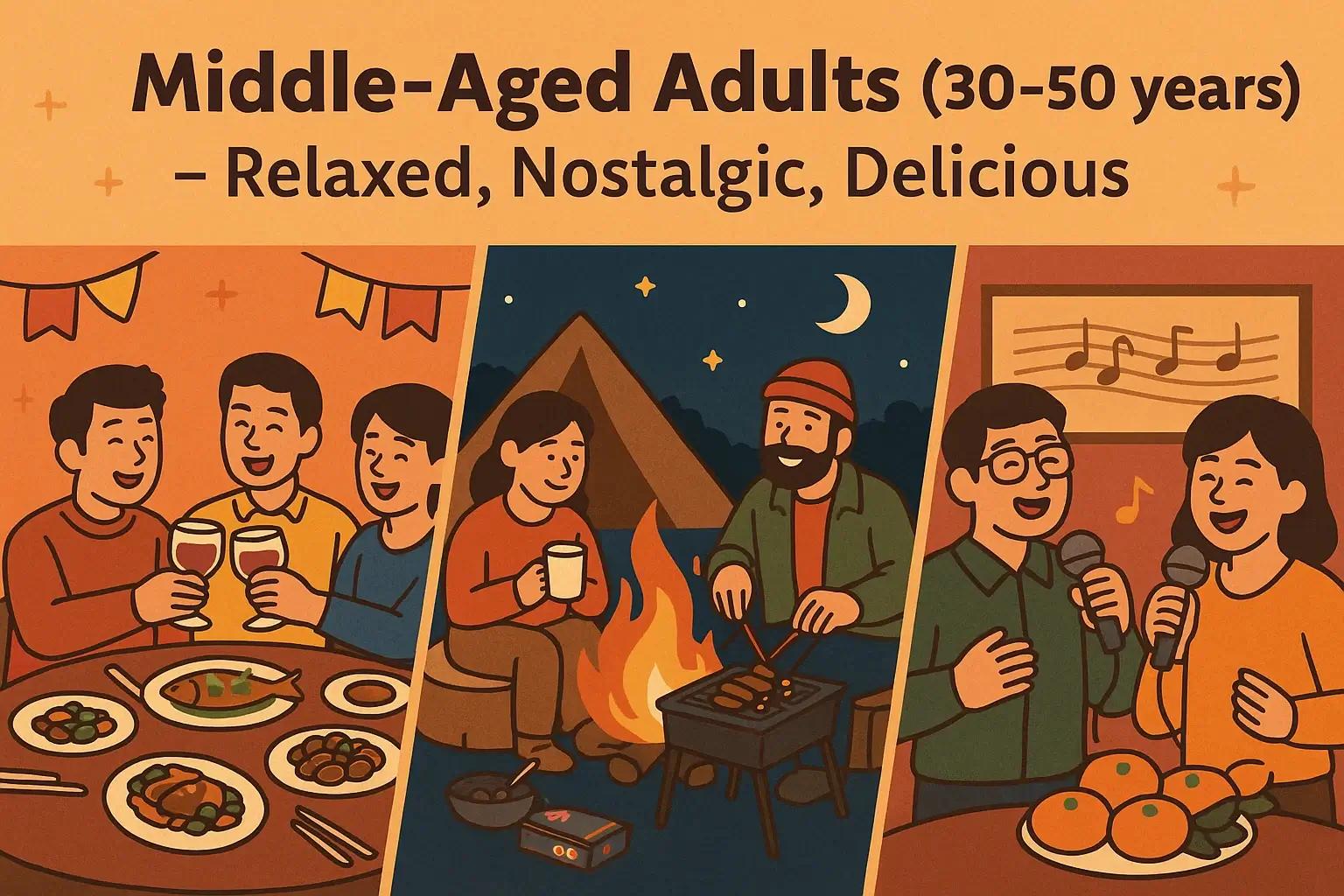
🔥 Popular Approaches
Premium Private Dining with Drinks The preference leans toward booking private rooms for authentic Chinese cuisine like Shunde or Shanghai-style dishes, paired with wine or baijiu (Chinese liquor). A popular addition is the "story relay" game where each guest shares a memory with the birthday person.
Outdoor Camping BBQ or Tea Ceremonies Suburban camping sites offer barbecue setups with beer and guitar sing-alongs. During winter months, the trend shifts to "围炉煮茶" (sitting around the fire brewing tea), featuring roasted oranges, sunflower seeds, and casual gossip sessions.
Nostalgic KTV Nights These involve booking luxury karaoke rooms for singing classics by Jay Chou, Stefanie Sun, and Jacky Cheung. Popular additions include "lyric relay" games where those who can't continue the song face penalties like drinking Laoshan White Flower Herb Water (a notoriously bitter Chinese beverage).
3. Seniors (50+ years) — Festive, Traditional, Lively
For older Chinese adults, ceremonial significance is paramount, but celebrations must align with their social preferences and cultural values.
🔥 Popular Approaches
Restaurant Birthday Banquets (Standard Choice) The traditional setup includes red tablecloths and longevity peach-shaped cakes, with children and grandchildren offering toasts. Many families hire traditional opera or folk music performances, such as Huangmei Opera or erhu concerts.
"Old Friends" Tea Gatherings These involve booking tea houses in parks for traditional tea service with classic Chinese pastries like mung bean cakes and dragon's beard candy. Entertainment often includes "guess the song" games featuring classics like "Sweet Honey" and "Jasmine Flower."
Extended Family Photo Sessions Professional photographers are hired for formal Chinese-style family portraits, with everyone dressed in Tang suits or qipao (cheongsam). These photos are treasured keepsakes that older Chinese adults particularly cherish.
4. Cultural Considerations
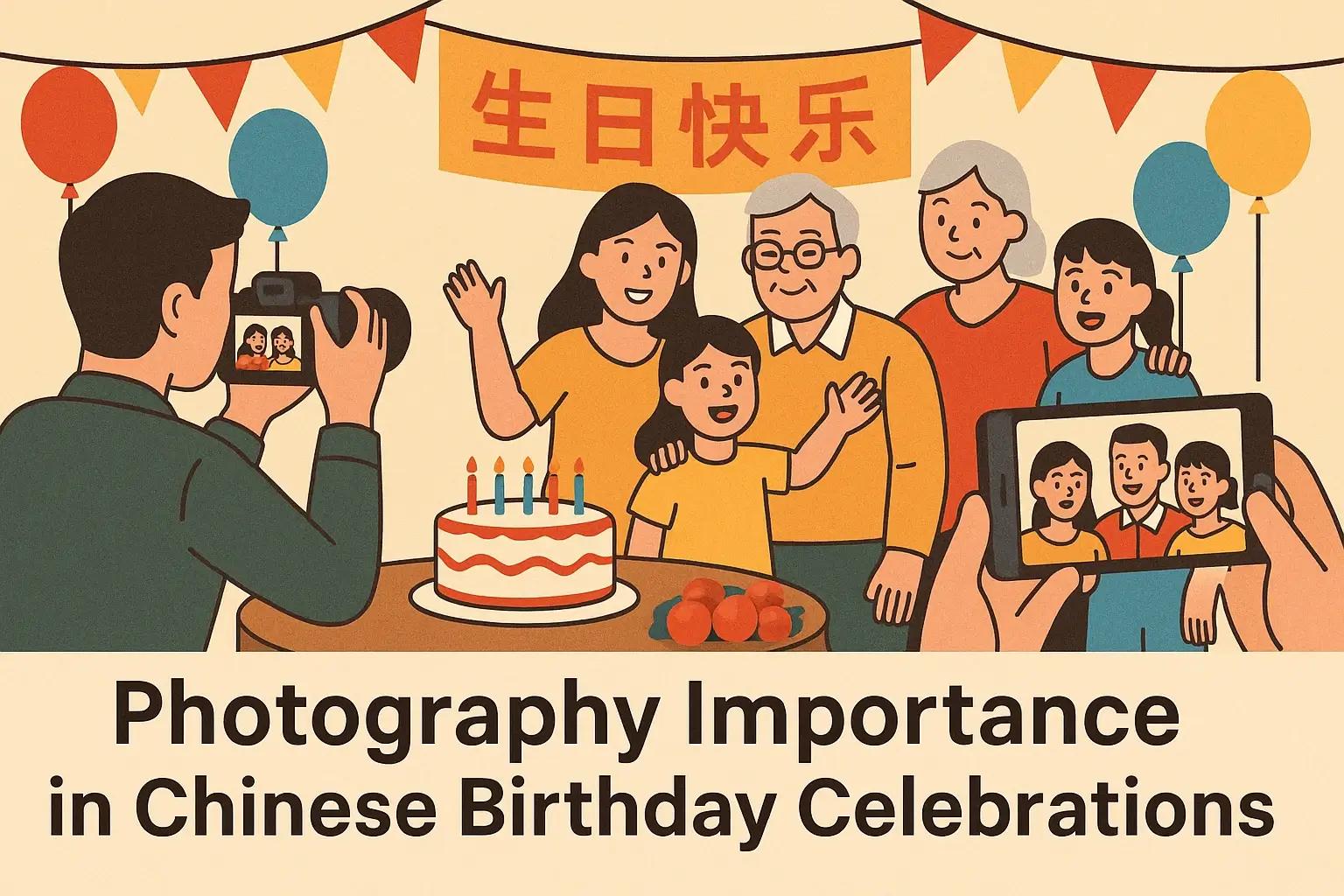
Across all age groups, certain elements remain consistently important in Chinese birthday celebrations:
- Food as a centerpiece: Every successful Chinese birthday party revolves around shared meals
- Collective participation: Individual performances or speeches are less common than group activities
- Symbolic elements: Even modern parties incorporate traditional symbols like longevity noodles or red decorations
- Photography importance: From professional family portraits to casual phone snapshots, capturing memories is essential
These celebrations reflect China's digital integration, where social media sharing influences party planning for younger groups, while older generations maintain focus on in-person connection and family unity.
Conclusion
Whether you’re wishing a toddler "BB仔生日快樂" (BB jái sāang yaht faai lohk) in Cantonese or honoring a grandparent with a "长寿宴" (chángshòu yàn, longevity banquet), each expression and ritual carries deep meaning. By embracing these traditions—whether through language, food, or festive games—you not only celebrate a birthday but also connect with a culture that cherishes harmony, prosperity, and the passage of time.
So next time you’re at a Chinese birthday party, don’t hesitate to raise your glass, sing along, and share in the joy. After all, the best way to say "Happy Birthday" is with sincerity, warmth, and a touch of cultural understanding. 生日快乐!(Shēngrì kuàilè!) 🎉

Contributor
HappyBirthdayWiki love helping people celebrate life's special moments. With a knack for crafting heartfelt messages, we enjoy sharing creative birthday wishes that make every celebration unforgettable. When we are not writing, we explore new ideas for making birthdays meaningful and joyful for loved ones of all ages.